What was learned in a peek behind Georgia Tech’s curtains

This is the world that Georgia Tech has entered in, ushered in by coach Geoff Collins. A meeting for the offense whose call to order was “Put On,” the Young Jeezy hit that was once a de facto anthem for the Tech football team, blasting through the speakers.
In the full-team meeting, in between reviews of video clips from the previous practice, Collins introduced his “Money Down” cadre – student assistants jumping, screaming and waving signs to exhort the defense on third downs. (You’ll likely see them next season on the sidelines at Bobby Dodd Stadium.)
To help reinforce a message about situational awareness, he showed a highlight from an NCAA tournament game the past weekend. Collins’ roughly 25-minute presentation to preview practice and set the tone included tweets, a motivational video and a call to continue to remember fallen teammate Brandon Adams.
On Tuesday, Collins allowed media a four-hour look into his first spring practice at Tech – a meeting for the offense or defense, position groups, the full team and then practice – beginning around 7 a.m., just as the offense and defense convened meetings. Collins’ style has been a jolt to the system for all involved.
“It’s something that I really wasn’t used to, waking up, going through meetings, music playing, 7 a.m., coaches screaming,” running back Christian Malloy said. “But that gets you going. You don’t even know it’s 7 a.m.”
The energy and tempo that Collins has sought to infuse were on display throughout the morning in ways large and small. When the team began practice, the players who had arrived first for individual warm-ups created a tunnel for the rest of the team to run through, yelling and clapping.
Players and coaches ran quickly between periods. Hip-hop music played throughout practice. Coaches hollered at players, as per usual, but also got on players to yell during practice, too.
Running back Omahri Jarrett said that coaches warned players to get their conditioning levels ready for spring practice, saying it would be “amped up.” Jarrett said players were a little skeptical.
“We got here the first day, and everybody was gassed,” he said.
During offense vs. defense drills in practice, it’s not uncommon for three separate groups to be running simultaneously, trying to collectively hit a target of 45 to 50 snaps in an 11-minute period, all the better to give more players more repetitions.
“You learn the game by playing the game, not by watching,” wide receivers coach Kerry Dixon said.
It is an estimable volume. Asked how many plays his team might have run in a similar time frame when he was playing for the Yellow Jackets, running-backs coach Tashard Choice replied, “Not even close.”
It might be especially useful for a team that is transitioning to a different style of play on offense and defense. Slot receiver Nathan Cottrell, formerly an A-back, called the increase in practice reps “a night-and-day difference. Everybody’s getting reps. So it’s not like anybody’s got a play off. It helps tremendously.”
On this day, special teams and situational football were emphases – periods devoted to two-minute drills and second-down play, for instance. In the team meeting, Collins shared statistical evidence of Temple’s success in two-minute situations on both offense and defense to hit home his priority on that facet of the game.
“Coach Collins does a great job of making sure that everything we see over the course of the year gets practiced, and practiced a lot,” offensive coordinator Dave Patenaude said to the offense during the unit meeting.
Collins’ attention to special-teams play was clear. For instance, he led one of the stations when the team rotated through a battery of special-teams drills. It could be a significant development for a team that rarely stood out in the kicking game through coach Paul Johnson’s tenure.
“Special teams is one of the things we focus on the most in meetings,” Cottrell said.
Tech, which concludes spring practice with the spring game April 26, has transitioned to a new day, one that begins early in the day and is not quiet.
“If you’re not jumping around, screaming, yelling – go back,” Jarrett said. “Go back, turn back around.”



